Looking for cost-effective SEO tools without sacrificing control? Open-source SEO tools are the solution. These tools are not only free but also allow you to self-host, customize, and maintain full control over your data.
What is Open-source SEO software?
Open-source SEO software is a self-hosted (or fully inspectable) tool for crawling, audits, rank tracking, reporting, and SEO APIs - so you can customize workflows and keep your search data in-house. In this list, we prioritized tools that are actively maintained, easy to run locally (often via Docker), and cover core SEO tasks such as auditing, tracking, and reporting.
Best Open Source SEO Tools at a Glance
- RustySEO – Best all-in-one open source SEO software for deep audits, reporting, and log analysis.
- GSC Bulk Data Downloader – Best for bulk Google Search Console exports and automated SEO reporting.
- ContentSwift – Best for open source content research and SERP-driven content optimization.
- SerpBear – Best open source SEO platform for keyword rank tracking and ongoing monitoring.
- SEOnaut – Best for technical SEO audits focused on crawlability and indexing issues.
- SEO Panel – Best open source SEO reporting software for agencies and multi-site management.
- SEOJuice – Best for open source link analysis and link-building opportunity discovery.
- Greenflare – Best for fast technical SEO crawling and large-scale site audits.
- oguzhan18/seo-tools-api – Best SEO API for embedding SEO checks and scoring into custom apps.
1. RustySEO
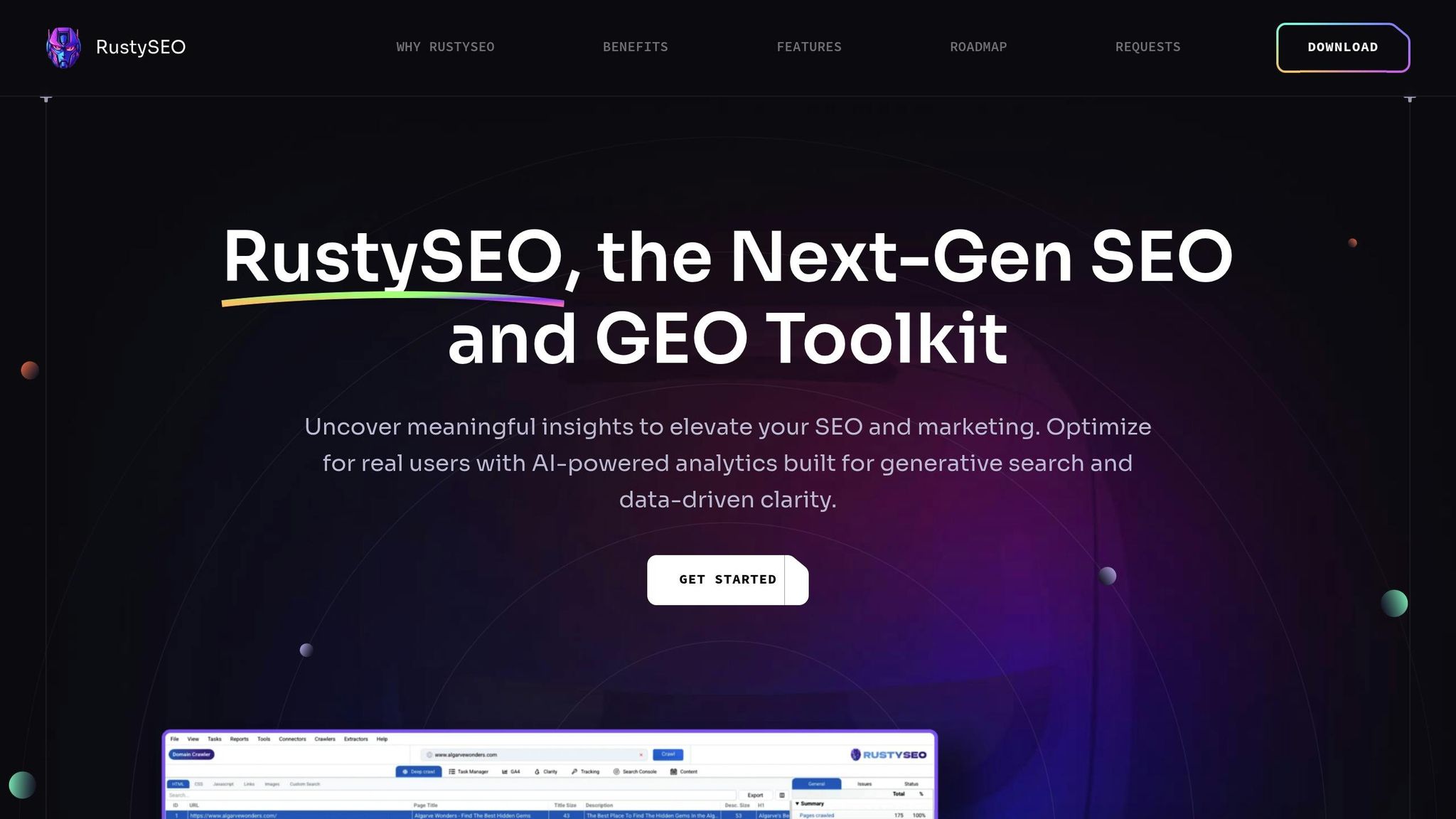
RustySEO is an all-in-one, cross-platform Marketing toolkit, designed for comprehensive SEO & GEO analysis. It enables users to crawl websites, analyze server logs, and gain actionable insights into their marketing and SEO strategies.
Key Features:
- Shallow & deep crawl
- Technical Diagnostics (core web vitals, Page Speed Insights)
- On-Page SEO Analysis (content analysis, Keyword density, etc...)
- Improvements / Suggestions on page crawl
- Dashboards
- Task Manager / Tracker
- Reporting (CSV, Excel, Google Sheets, PDF)
- Topic generator
- Keyword generator
- Local LLM (ollama)
- Free API LLM (Google Gemini)
- Built-in AI chatbot
- Crawl history
- Image conversion and optimization.
Who It's Best For: Developers and SEO experts are seeking a high-performance solution for website optimization.
2. GSC Bulk Data Downloader

The GSC Bulk Data Downloader is a handy tool for exporting large sets of Google Search Console keyword data as CSV files, making it easier to analyze and incorporate into your SEO strategies.
Key Features
- Bulk CSV Export: Quickly download extensive keyword data in CSV format, ready for analysis or integration with business intelligence tools.
- Detailed Metrics: Gain access to key stats like actual visits, impressions, click-through rates, and average positions for keywords, broken down by time frames and regions.
- Built-in API: Seamlessly integrate with marketing automation tools, reporting platforms, or custom SEO workflows.
- Google Ads Integration: Connect with Google Ads test accounts to access monthly search volume data and brainstorm keyword ideas.
These features simplify the process of analyzing large datasets and folding them into your SEO workflow.
Why It’s Useful
By automating data extraction from Google Search Console, this tool eliminates the need for manual downloads. It’s a time-saver for SEO professionals managing multiple websites or conducting large-scale audits, enabling faster and more efficient performance analysis.
Who Should Use It
This tool is perfect for SEO agencies, enterprise teams, and developers who need a reliable way to automate bulk data analysis.
3. ContentSwift
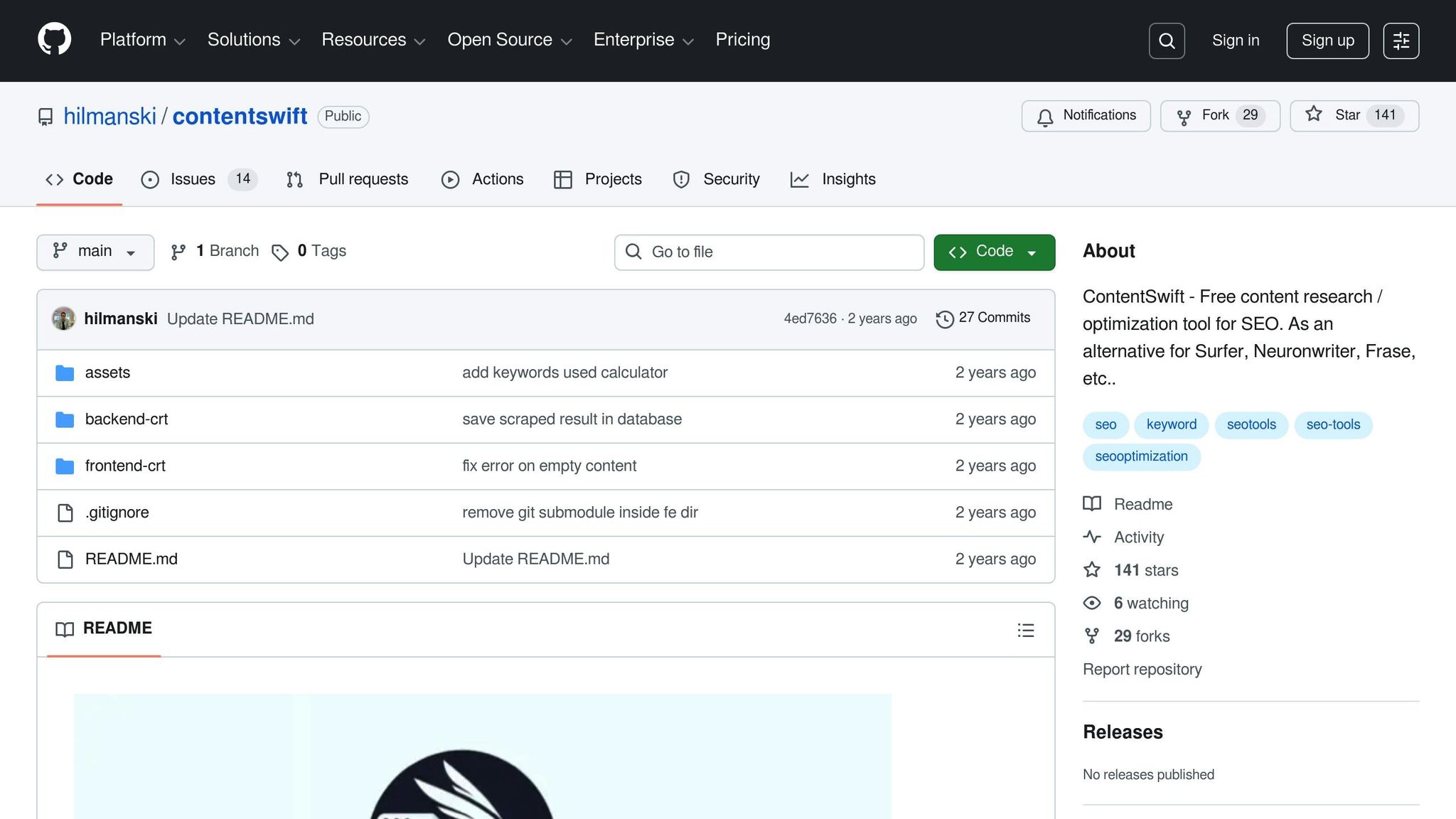
ContentSwift is a free and open-source tool designed to help you research and optimize content by analyzing top-ranking pages. It delivers insights tailored to specific keywords and provides actionable tips inspired by successful content strategies. Here's a closer look at its standout features and integrations.
Content Optimization Features
One of ContentSwift's key tools is its "keywords used calculator", which helps you assess keyword density and usage trends across competing pages. Additionally, it evaluates word frequency to identify patterns favored by search engines.
Developer-Friendly Integrations
For developers, ContentSwift includes a FastAPI-based API and supports Docker deployment with a simple command (docker-compose up -d --build). It’s built using PostgreSQL and Next.js. To enable Google SERP scraping, you’ll need to set the SERPAPI_KEY in the .env file located in /backend-crt/src.
This tool is particularly useful for individual developers and small teams looking to automate content analysis quickly. Since it focuses exclusively on Google SERP results, it provides targeted insights ideal for testing and preliminary analysis. These features make it a helpful resource for SEO professionals aiming to streamline and fine-tune their content strategies.
4. SerpBear
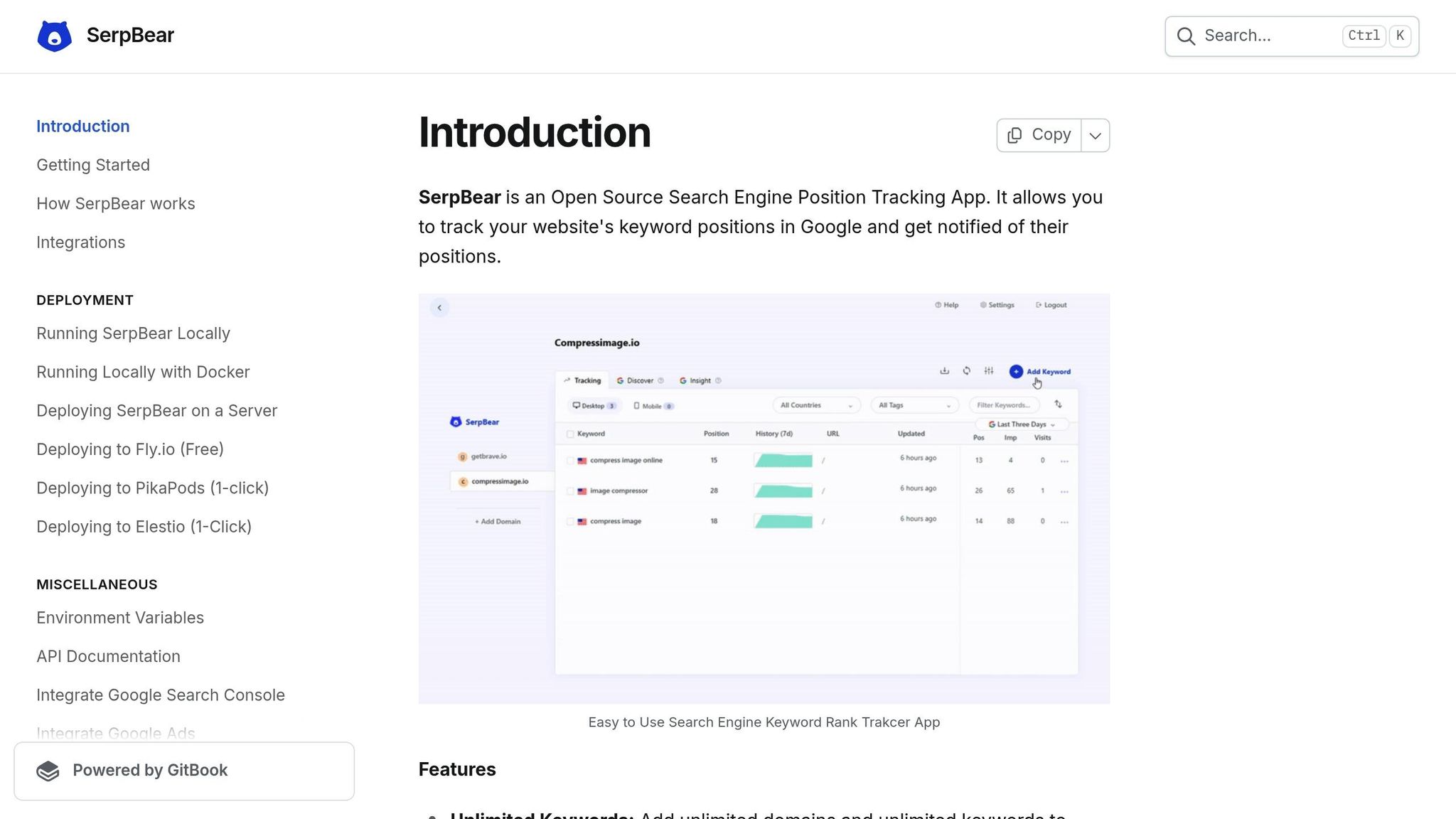
SerpBear is an open-source tool designed to track your website's keyword rankings on Google. Its ability to handle unlimited tracking and its flexible integrations make it a practical choice for SEO professionals looking to monitor keyword performance effectively.
Technical SEO Features
SerpBear can manage unlimited domains and keywords at the same time, making it a great option for agencies or businesses juggling multiple websites. It also offers automated email alerts for keyword ranking changes, which can be set to arrive daily, weekly, or monthly - keeping you updated without lifting a finger.
Through its integration with Google Search Console, SerpBear provides insights into visit counts and impressions for every tracked keyword. This helps you uncover new keyword opportunities and pinpoint your top-performing keywords, pages, and even countries. Additionally, by connecting with Google Ads, it provides monthly search volume data, giving you a clearer picture of keyword performance. These features ensure you're always working with accurate, up-to-date information.
Data Visualization and Reporting
SerpBear makes it simple to export your keyword data and domain insights as CSV files. This flexibility allows you to create custom reports or dive deeper into the data using your favorite spreadsheet tools.
Developer-Friendly Integration Options
SerpBear isn’t just about tracking - it’s built with developers in mind. The platform offers full access to its codebase, letting you customize and expand its functionality as needed. It also includes a built-in SERP API, which allows developers to feed ranking data directly into their own marketing or reporting systems.
Built using Next.js and SQLite, SerpBear features clean, customizable code and supports Docker deployment for added convenience. The API integration is especially handy for businesses that want to incorporate ranking data into existing dashboards or automate their reporting processes, making it a highly adaptable tool for any SEO strategy.
5. SEOnaut
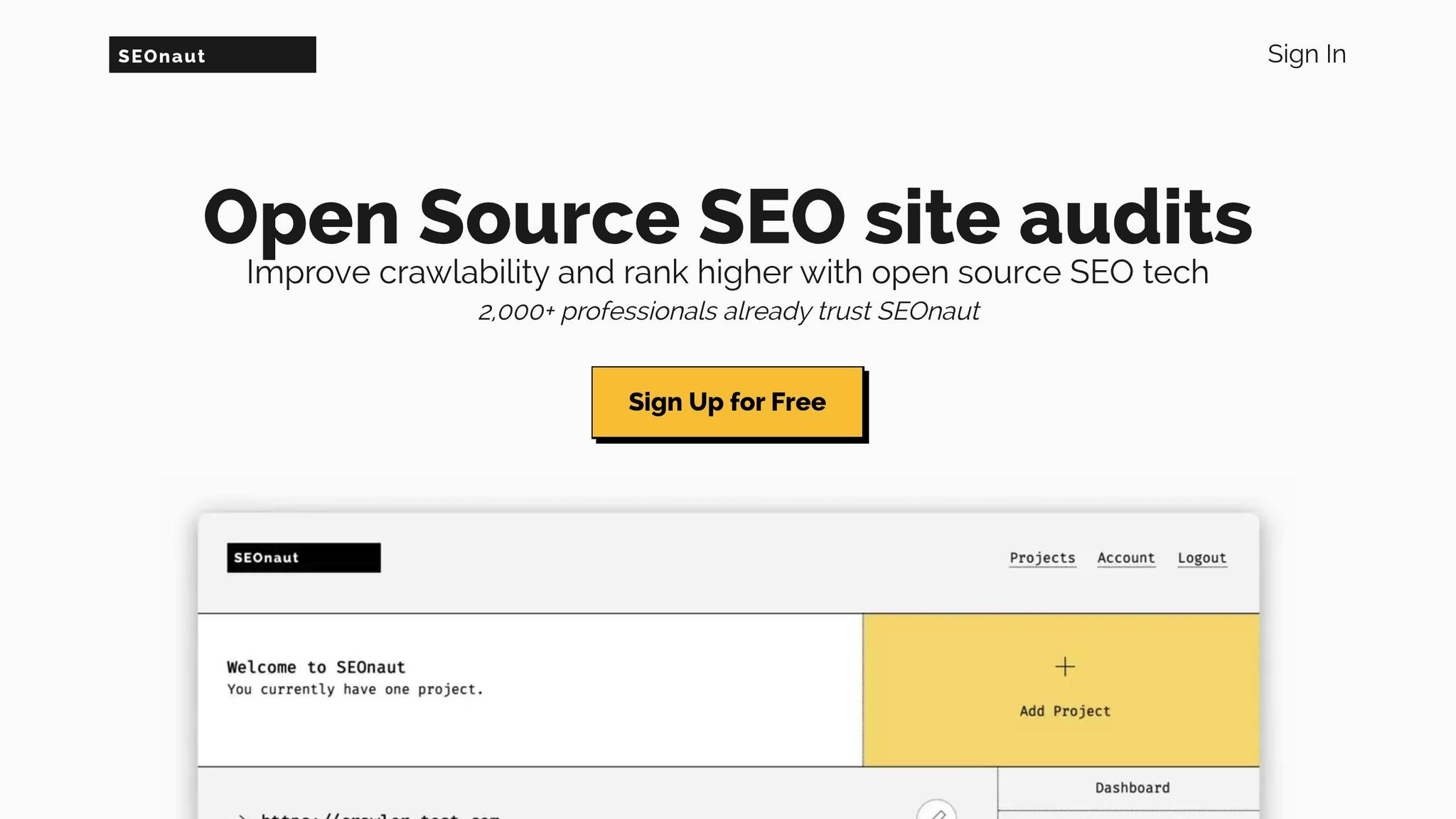
SEOnaut is an open-source tool designed to help improve website crawlability and indexing. With over 2,000 professionals using it, this platform focuses on optimizing crawl budgets and identifying indexing problems. It combines advanced technical features with efficient audit and reporting capabilities.
Technical SEO Features
SEOnaut dives deep into technical SEO by analyzing URL structures and tracking essential metrics. It allows for highly customizable crawls, including bypassing robots.txt, following blocked links, crawling noindex pages, scanning sitemaps, and even working with password-protected staging servers. This makes it a valuable tool for agencies managing client websites still in development. Plus, its on-demand crawling feature ensures you always have up-to-date insights.
Visual Data and Reporting
The platform includes a user-friendly dashboard that visually presents key SEO metrics and trends. This data is crucial for automated SEO performance analysis. Reports are simple to export, making it easier for teams to collaborate and align on strategy.
Flexible for Developers
SEOnaut, licensed under MIT, offers complete code transparency and supports free self-hosted deployment. Developers can tweak and adapt the tool to fit specific requirements, while its active community continuously contributes to its improvement.
6. SEO Panel
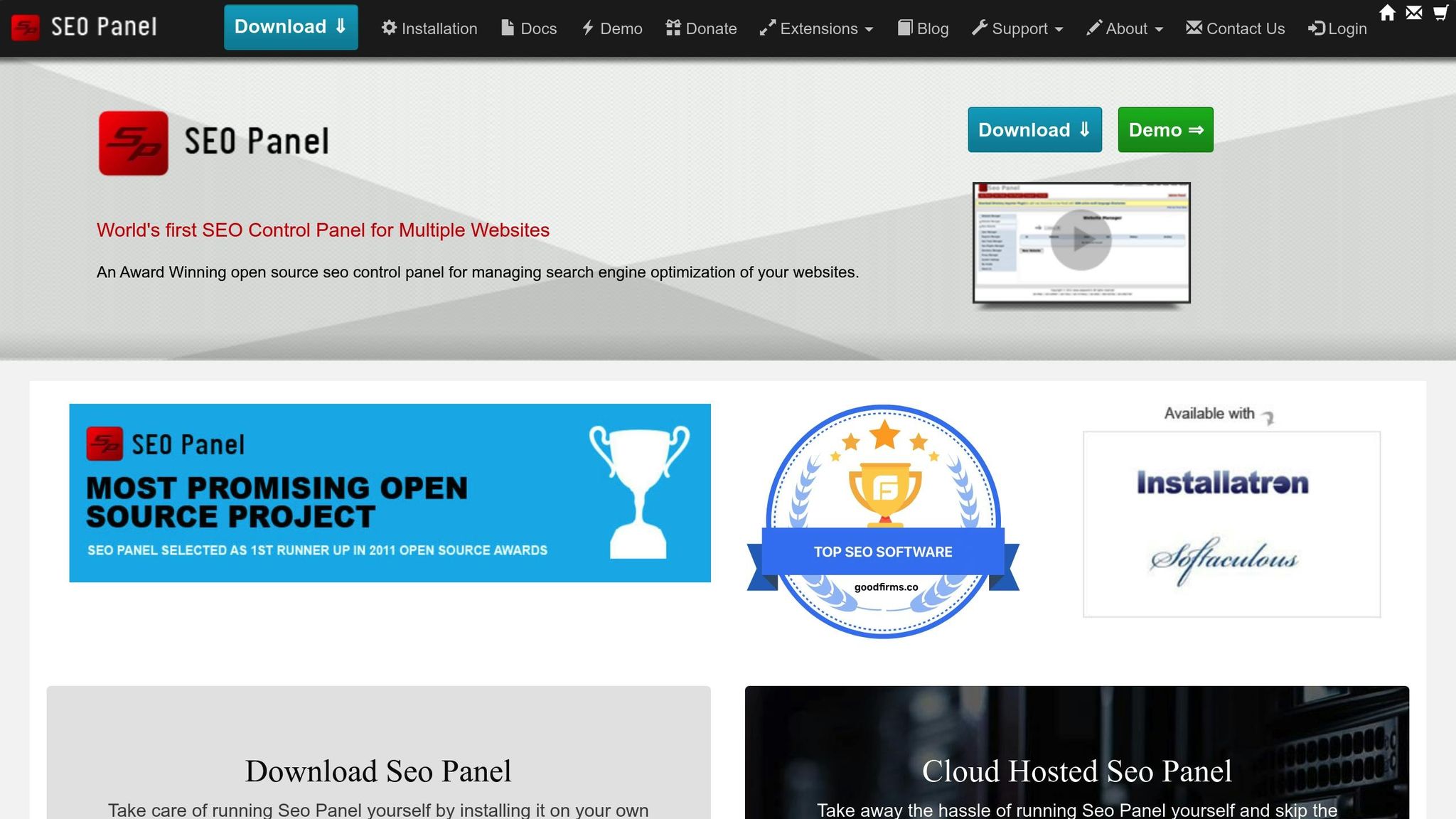
SEO Panel is an open-source platform designed to help optimize websites by offering tools like keyword tracking, site audits, and more. It combines a comprehensive feature set with detailed analytics and flexible integrations.
Technical SEO Features
SEO Panel excels in monitoring technical SEO through automated website audits. It scans for issues like broken links, missing meta tags, and duplicate content. The platform also evaluates page load times, detects HTML errors, and checks server response codes. On top of that, it tracks keyword rankings and includes a backlink monitoring tool to identify potentially harmful links.
Visual Data and Reporting Tools
The platform’s dashboard transforms raw SEO data into easy-to-understand visualizations, such as charts and graphs. These tools help users track essential metrics like keyword ranking changes and traffic trends. Additionally, customizable reports allow users to monitor performance effectively and tailor insights to their needs.
Developer-Friendly Features
Built using PHP/MySQL, SEO Panel offers an API framework that simplifies integrations and provides programmatic access to SEO data. Developers can also modify the source code to adapt the platform to specific business needs, offering flexibility for custom functionality.
sbb-itb-b8bc310
7. SEOJuice
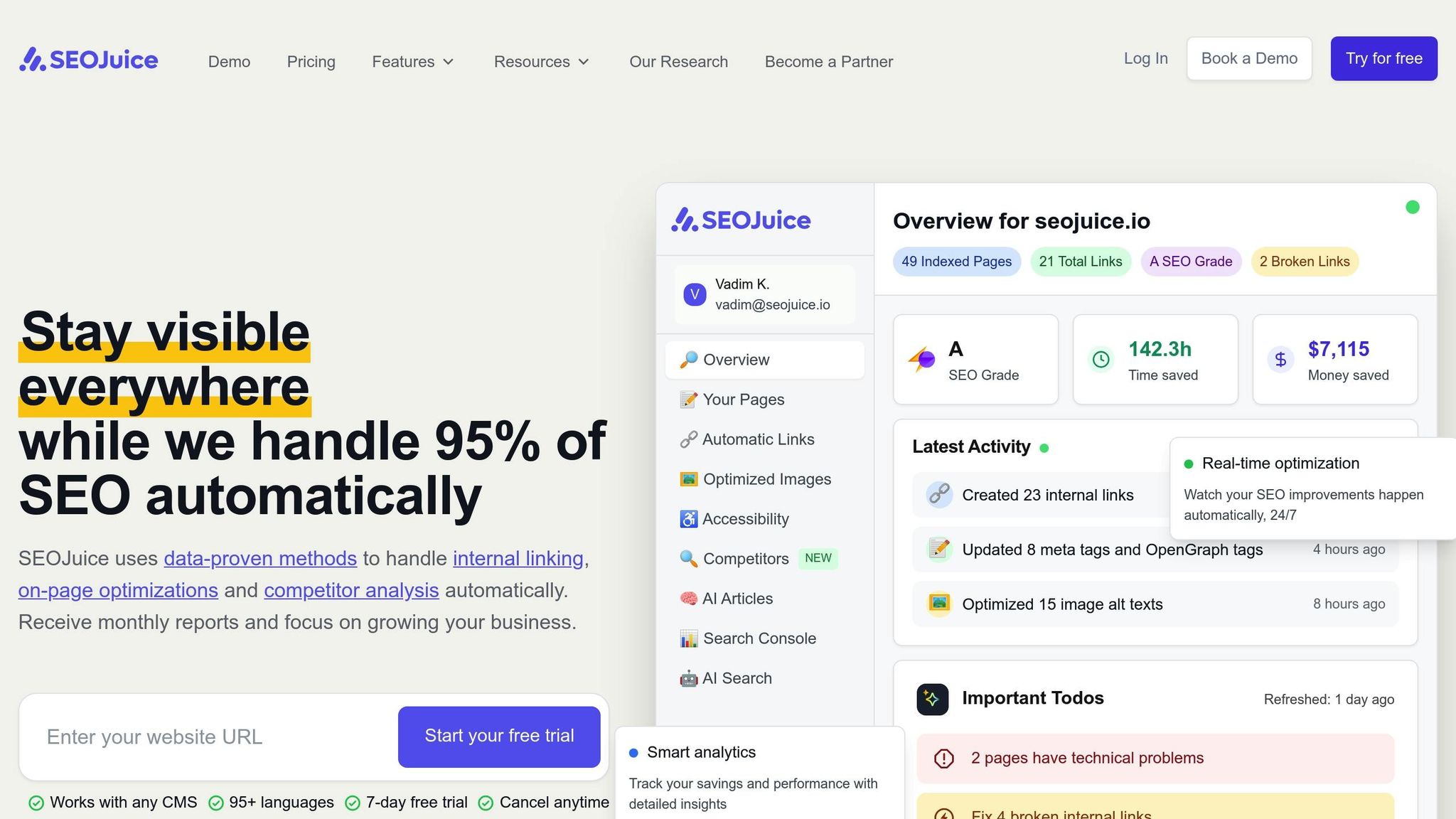
SEOJuice is an open-source SEO tool, but it comes with minimal documentation, making its full range of features somewhat unclear. Without detailed guidance, understanding its scanning or auditing capabilities often requires diving into the code directly.
This lack of documentation also pushes developers to explore the tool’s codebase if they want to customize it. Since SEOJuice is open-source, its source code is accessible for modifications. However, specifics about integration or API functionality are not well-documented, so developers aiming to adapt the tool to their needs will need to investigate the code for a clearer picture of what’s possible.
8. Greenflare
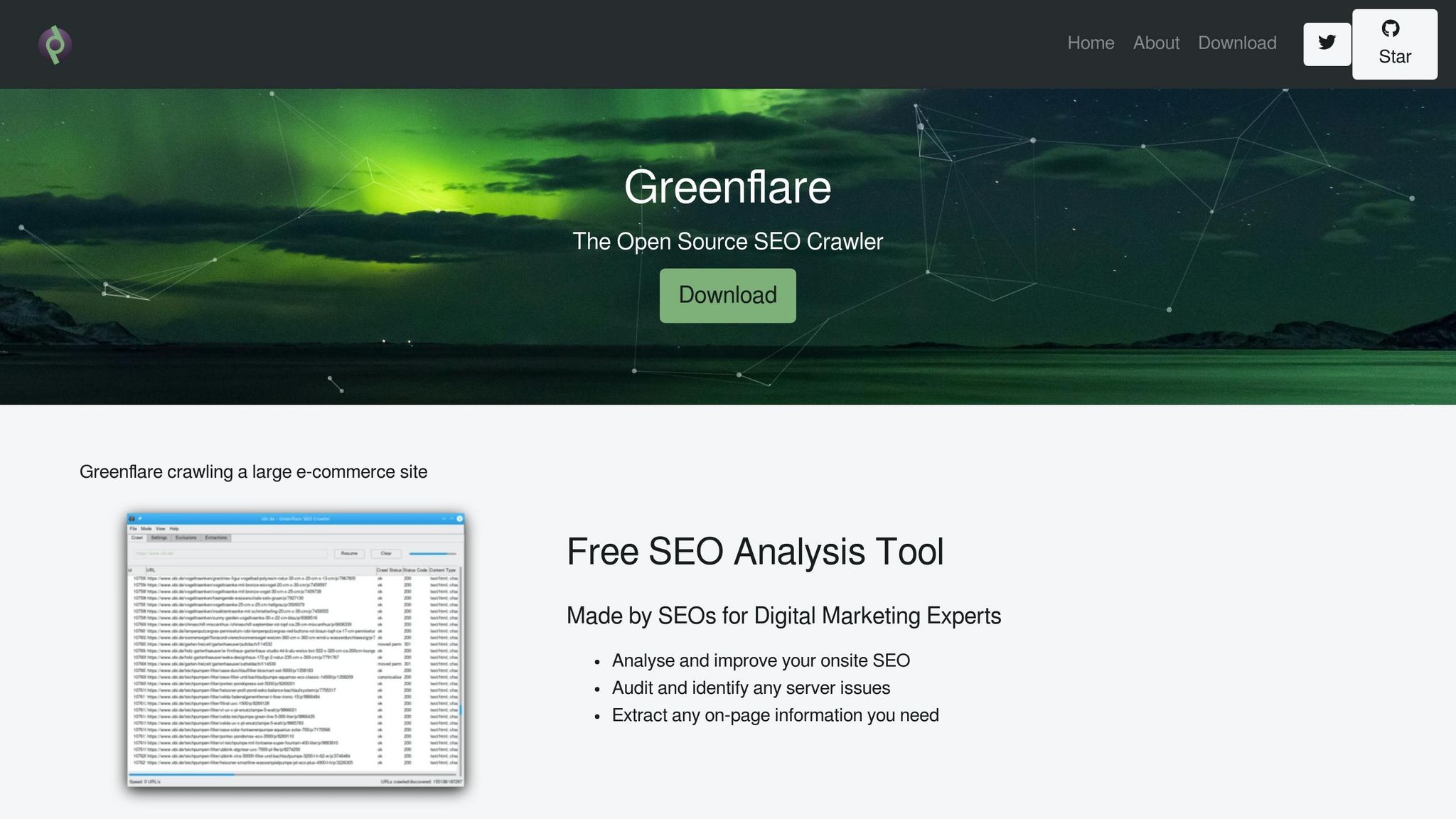
Greenflare is an open-source SEO crawler designed to perform in-depth web audits with adjustable settings and detailed analysis.
Key Features
- Fast Crawling Engine: Conducts quick website scans using multi-threaded crawling, making it suitable for large-scale audits.
- Customizable Crawl Settings: Allows you to adjust crawl depth, manage redirects, and set custom user agents tailored to your audit needs.
- Detailed Reporting: Provides in-depth reports on status codes, response times, and page-level SEO issues.
- Export Options: Enables you to save crawl data in formats like CSV and Excel for further examination.
Why Use Greenflare?
- Budget-Friendly Solution: Offers powerful crawling features without the need for subscription fees.
- Developer-Friendly: Being open-source, it gives developers the freedom to tweak crawling settings or add custom features.
- Scalable for All Sizes: Works effectively for both small websites and large, enterprise-level domains.
Best Suited For
Greenflare is an excellent choice for technical SEO specialists, web developers, and agencies that require detailed site audits. It’s especially useful for those who want robust crawling capabilities without the cost of commercial tools.
Greenflare stands out by offering flexibility and reliability, making it a solid addition to your SEO toolkit.
9. oguzhan18/seo-tools-api
For those diving into open-source SEO solutions, oguzhan18/seo-tools-api is a standout option hosted on GitHub. This API allows developers to seamlessly incorporate SEO analysis into their custom workflows. This is particularly useful when looking to automate SEO workflows using modern AI tools.
Built for Developers
This API is designed with developers in mind. It follows a RESTful architecture, offers thorough documentation, and includes code examples in JavaScript, Python, and PHP. It supports simple HTTP requests and batch processing, making it easy to handle multiple queries at once. The data is returned in JSON format, ensuring a smooth and hassle-free integration process. Plus, the API supports advanced data visualization, making it a versatile tool for developers working with SEO data.
Streamlined Visualization and Reporting
The API delivers structured JSON responses packed with key SEO metrics. These metrics can be effortlessly paired with popular visualization libraries and reporting tools. This makes it simple to create dashboards or automate SEO performance reports, providing clear insights and actionable data for any project.
Feature Comparison Table
The table below provides a quick, side-by-side comparison of popular open-source SEO tools. It highlights their main functions, key features, pricing, and ease of use, helping you identify the best fit for your SEO needs.
| Tool | Primary Function | Key Features | Pricing | Best For | Ease of Use |
|---|---|---|---|---|---|
| RustySEO | SEO Analysis & Optimization | Site audits, keyword tracking, performance monitoring | Free | Small to medium websites needing detailed analysis | Moderate |
| GSC Bulk Data Downloader | Google Search Console Data Export | Bulk data downloads, automated reporting, CSV exports | Free | SEO pros managing multiple GSC accounts | Requires technical setup |
| ContentSwift | Content Research & Optimization | SERP analysis, keyword insights, content optimization tips | Free (requires SerpApi key) | Content creators exploring top-ranking articles | Requires technical setup ("Not for production") |
| SerpBear | Keyword Rank Tracking | Unlimited keyword tracking, email alerts, GSC integration, mobile PWA | Free (5,000 lookups/month via ScrapingRobot) | SEO experts tracking keyword positions | Easy to use |
| SEOnaut | Technical SEO Audits | Crawlability checks, site structure reviews, ranking issue detection | Free (Community), $9/month (Growth plan) | Technical SEO specialists and developers | Intuitive dashboard |
| SEO Panel | All-in-One SEO Management | Keyword tracking, site audits, report generation, multi-user support | Free | Agencies managing multiple clients | Moderate learning curve |
| SEOJuice | Link Building & Analysis | Backlink analysis, link opportunities | Free | SEO pros focusing on link-building strategies | User-friendly interface |
| Greenflare | SEO Crawling & Analysis | Website crawling, technical SEO insights, data exports | Free | Technical SEOs needing detailed crawl data | Best for advanced users |
| oguzhan18/seo-tools-api | SEO API Services | Meta tag analysis, sitemap creation, SEO scoring APIs | Free | Developers adding SEO features to apps | Requires developer expertise |
Conclusion
Open-source SEO tools provide an affordable alternative to pricey commercial platforms. For instance, while basic rank tracking services from commercial platforms typically cost between $18 and $49 per month, SerpBear offers unlimited keyword monitoring for free when self-hosted. On top of that, you can enjoy up to 5,000 free SERP lookups per month through ScrapingRobot. This translates to potential savings of around $216 to $588 annually compared to paid options.
Tools like ContentSwift enhance content research and optimization using free SerpApi credits, while SEOnaut's Community plan supports self-hosted technical audits. If you need more, their Growth plan is available for just $9 per month, making it a budget-friendly choice.
Self-hosting these tools doesn’t just cut costs - it also gives you complete control over your SEO data and infrastructure. Take SerpBear, for example. You can deploy it on free platforms like mogenius.com or Fly.io, which eliminates ongoing operational fees. This is especially valuable for agencies managing multiple clients or businesses with ever-changing SEO needs. By owning your data and infrastructure, you also unlock the ability to customize these tools to fit your exact requirements.
The flexibility of open-source tools lets you scale your SEO efforts without overspending. Whether you’re tracking keywords with SerpBear or running in-depth site audits using SEOnaut, these tools adapt to your needs and budget, keeping extra expenses to a minimum.
FAQ: Open Source SEO Tools & Software
What are the best open source SEO tools?
Some of the best open source SEO tools include RustySEO, SerpBear, SEO Panel, SEOnaut, Greenflare, ContentSwift, GSC Bulk Data Downloader, SEOJuice, and oguzhan18/seo-tools-api. Together, they cover audits, rank tracking, reporting, crawling, content optimization, and developer APIs.
What is the best open source SEO software for most users?
For an all-round “SEO software” feel, RustySEO is a strong default: it combines crawling, on-page analysis, log analysis, dashboards, and reporting in one self-hosted tool. If rank tracking is your main need, SerpBear is usually the better “best” choice.
Is there open source SEO reporting software for marketing teams?
Yes. SEO Panel and RustySEO both work well as open source marketing and SEO reporting software. They let you track keywords, run audits, and export reports (CSV, Excel, PDFs), so you can plug them into existing dashboards or send reports to clients and stakeholders.
Is there open source SEO reporting software for agencies?
Agencies managing multiple clients can use SEO Panel as an open source SEO reporting platform. It supports multi-site tracking, user management, and scheduled reports. Pair it with GSC Bulk Data Downloader or SerpBear for deeper keyword and GSC-based reporting.
What is an open source SEO platform?
An open source SEO platform is a self-hosted tool or toolkit that you can install on your own server, inspect the code, and customize. Tools like SerpBear, SEO Panel, and RustySEO act as SEO platforms because they centralize ranking, crawl, and reporting data in one place.
Are open source SEO tools as good as paid tools?
For many use cases—technical audits, crawling, rank tracking, and basic reporting—open source SEO tools are “good enough” and often comparable to paid tools. You trade polished UX and support for full data ownership, no per-seat pricing, and the ability to customize features.
How do I choose the right open source SEO tool?
- Need rank tracking → start with SerpBear.
- Need technical audits & crawling → try RustySEO, SEOnaut, or Greenflare.
- Need reporting & client dashboards → use SEO Panel + GSC Bulk Data Downloader.
- Need content optimization → add ContentSwift.
- Need developer APIs → use oguzhan18/seo-tools-api.